 |
 |
 |
 |
 |
 |
 |
 |
 |
First Division - Turf Moor - 26,423
Scorers: Bremner 23 min
Burnley: Thomson, Smith, Latcham, Dobson, Waldron, Blant, Thomas, Murray, Casper, Coates, Kindon
Leeds United: Sprake, Reaney, Cooper (Lorimer 70), Bremner, Charlton, Hunter, O'Grady, Giles, Jones, Madeley, Gray
United were sitting atop the Division One table as they travelled to
Turf Moor to face a promising young Burnley team. They had dropped just
four points in 13 games and came into the game on the back of three successive
clean sheets in the league. Their only Division One reverse had come the
month before, away to reigning champions Manchester City, though during
the week they had bowed out of the League Cup after losing 2-1 at Second
Division Crystal Palace. It was clear, though, that United had treated
the defence of the trophy they had won in March less than seriously. Terry Lofthouse in the Yorkshire Evening Post: 'When the final
reckoning is made at the end of the season, Leeds United's 2-1 defeat
by Crystal Palace in the fourth round of the League Cup may have been
a blessing in disguise. Their primary aim now that they have tasted success
in the League Cup and the Inter Cities Fairs Cup, both trophies being
currently held by the club, is the supreme title - the league championship.
So with no further interest in the League Cup they can concentrate on
achieving their main objective.' Manager Don Revie had recognised
that sustaining a four pronged assault on the honours, as Leeds had done
in 1967/68, was simply too taxing.
The priority this year was solely the securing of the championship. United had 'enjoyed' a difficult relationship with Burnley since
they returned to Division One in 1964. In March 1965, referee Jack Taylor had called the two teams together
on the pitch and dished out a general warning for their rough
behaviour. A year later, Eric Jennings was forced to repeat the
dose and in September 1966 there was a very public falling out
between Revie and Burnley manager Harry Potts after another stormy
confrontation. Revie said: 'After what he has said in a Sunday newspaper, I must speak,
if only to defend the lads. Mr Potts should put his own house in order
before he attacks Leeds United players and supporters. I was shocked by
what I read. Our young players were dismayed after the match at the way
they had been tackled.' Potts retorted, 'It is always Burnley's intention to go out and play
constructive and attractive football. That is our approach - but it takes
two teams to make a good football match. You can draw your own conclusion
from that.' Referee Ken Stokes booked five players and warned the police
in the second half about the Turf Moor crowd hurling objects at
Gary Sprake. He was reported to have threatened to abandon the
match, though he later strenuously denied it. Relations between the clubs were further strained by notorious
Burnley chairman Bob Lord, who would fall out badly with the United
board five years later, banning his own Kenneth Wolstenholme: 'Bob Lord is a strange man. For his name is known
by football fans all over Britain - and by people who don't care a fig
for football. For Bob Lord is one of the few real characters in football.
He has made more enemies and more friends than anyone else in the game.
To his friends he is a brilliant chairman and a fair man. To his enemies
he is just a loud-mouthed tub-thumper. To himself? "I'm the chairman
of Burnley Football Club, the best club in th' world" is how he would
put it. 'Bob Lord is Lancashire through and through. He is a typical Lancashireman
in so far as he will say exactly what he thinks. So many people - and
many of them are in football - are happy enough to speak their minds in
private, but once they get into public session they keep quiet, accept
what is given to them even though they may be unhappy about it. That is
not the way of Bob Lord. He says what he believes about an issue. And
what he has to say doesn't always make him popular. 'Not long after the Munich disaster in 1958, Bob Lord described the new
Manchester United as "a bunch of teddy boys". That was at the
time when the doings of Manchester United were saturated in public sympathy.
When Burnley were facing a congested fixture list due to their success
in the FA Cup and the European Cup, Bob Lord supported manager Harry Potts's
decision to select 10 reserves for the league game against Chelsea. Even
after Burnley had been fined £1,000 by the Football League, Bob Lord still
came out and said, in effect: "We were right and the Football League
is wrong to punish us." After one of Burnley's European Cup matches,
Bob Lord scorned the usual clichés and attacked the referee.' Uptheclarets.com: 'Certainly Lord never went out of his way to
be popular. His comments were frequently ill-thought out and rebounded
on him and Burnley FC. He got publicity for the club, but the old adage
that all publicity is good publicity certainly does not always hold true.
Among a wealth of faux pas perpetrated by Lord included a claim that Jews
who ran television were trying to obtain soccer on the cheap. And most
players he knew couldn't run a chip shop, let alone a football club, and
no more than ten percent of them knew the laws of the game. When the criticism
became too fierce, he would try to distance himself from the remarks,
but never with too much success. 'One way he responded to criticism was to blame the messenger. Journalists
often incurred his wrath and he was quick to ban individuals and the titles
they represented. Jack Cochrane got to know Lord through his involvement
with Lowerhouse Cricket Club, where he was at one stage chairman. He remembers
a Lancashire League knockout competition and Lord was approached by a
young reporter asking for a comment on the game. "Piss off,"
was the reply from the Burnley FC chairman. Cochrane chided him for being
discourteous when the reporter was only doing his job. He replied: "I'm
sick and tired of reporters always on my neck." The journalist working
for a local newspaper was David Davies, now the Football Association's
executive director and one of the most powerful figures in English football.' At the start of the season, Don Revie, seeking an answer to United's
lack of goals, had offered £80,000 for Burnley's Scottish forward
Willie Morgan. Morgan had been due to sign a new contract but Lord's intervention put
a stop to that and the two fell out badly. Morgan: 'When negotiations
started, Bob Lord made things very difficult. He wasn't used to players
talking back to him and banned me from the training ground. He had wanted
to bury the hatchet although I hadn't realised that A transfer to Elland Road looked a done deal, but, for some reason
known only to himself, Lord refused to sell to Revie and Morgan
moved instead to Manchester United. Burnley had started the season poorly, but were starting to recover.
Tony Scholes on the ClaretsMAD website: 'I suppose the story starts
at the beginning of October and a depressing Saturday afternoon which
left us on the wrong end of a 4-0 scoreline at home against Liverpool.
Three days later we were due to meet West Ham with no fewer than eight
first team players unavailable for one reason or another. 'In came some of the younger players, including two who had only just
a few months earlier been in the side that had lifted the FA Youth Cup.
With another home defeat expected, the new look team won 3-1, and with
only Ralph Coates ready to return from injury we then went to Stoke and
won by the same score. 'In the following midweek we went one better and beat Leicester City
4-0 in the League Cup, but now was a different sort of test, a Leeds United
team who were top of the League and had been beaten only once that season. 'It was the day surely to bring back some of the more experienced players
for a game as tough as this. John Angus, Arthur Bellamy and Dave Merrington
were back in light training but not close to a recall whilst one of the
two recent signings, Doug Collins, was suspended. That left Andy Lochhead,
Brian O'Neil and Jim Thomson, but none of them won their places back and
all had to be content with playing a reserve game at Maine Road as the
youngsters were given a vote of confidence. 'Let's get this really into perspective. The team, with an average age
of 22, albeit with three future England internationals and an Irish international
on the bench, was about to take on the league leaders, the champions elect
… There was a nervousness about Turf Moor, the fans didn't want to see
their young team suffer an embarrassing defeat, but there was no need
to worry.' Leeds' midweek defeat at Crystal Palace had seen them in diffident
form, with few of the players living up to expectations. Skipper
Billy Bremner was on Scotland duty in Copenhagen but returned
to the side at Turf Moor, with Peter Lorimer dropping to the bench. The young Burnley eleven were clearly up for the contest and
determined not to allow their illustrious opponents to establish
any sort of rhythm. They opened brightly: Ralph Coates made a
sharp, weaving run down the middle spreading panic through the
Leeds defence; winger Dave Thomas earned a corner after a run
down the right; two minutes later Thomas forced another and then
drew a foul from Terry Cooper. United cleared all three dead ball
situations, but it was clear that Burnley meant business. United responded with some pressure of their own as Cooper, Dave Thomas set up the first, scored after 18 minutes, with a
60-yard pass from his own penalty area to Frank Casper down the
other end. Casper laid the ball back to Coates who let fly first
time from 20 yards to beat Sprake. Almost immediately, United went two down. Sprake seemed to be
at fault when he allowed a long dropping centre from Coates to
float over his head, leaving Casper to old off Cooper's challenge
and nod the easiest of heading opportunities into an open net. A third goal came three minutes later as Leeds roused themselves
from their torpor. Burnley skipper Colin Waldron's clearance scraped
his own post as he conceded a corner. O'Grady's flag kick dropped
to Billy Bremner, who lashed the ball home emphatically, but the
goal provided little respite. True enough, United stoked up a head of steam and came close
to an equaliser; Mick Jones shot over from inside the six-yard
box and then Eddie Gray struck the upright before Giles put a
rising drive just wide from close in, but Leeds could sustain
no permanent dominance. Eric Stanger in the Yorkshire Post: 'They were outthought, outpaced
by these youngsters who ran, chased and never gave in in the manner that
Leeds used to do before they reached maturity. They never allowed Leeds
to settle, particularly Bremner and Giles, who were prevented from controlling
the middle by close marking and even quicker tackling. Seldom can those
two have spent a less profitable afternoon.' Sprake had to pull off a smart save from a piledriver by Martin
Dobson after Coates fashioned the opening and Waldron's header
went close from a Thomas free kick as Burnley finished the half
well on top, receiving an enthusiastic ovation from the home crowd
as they went in 2-1 ahead. The game was all but over seconds after the restart. Burnley
inside-forward John Murray had been in blistering form for the
Lancastrians in recent weeks. He earned the epithet the Goal Machine
with eight successful strikes in as many games, securing an England
Under-23 spot as reward. Eddie Gray tried to clear a long through
ball from Waldron, but only set a chance up for Murray, who collected,
barged past Madeley and Gray, swivelled and left Sprake rooted
to the spot with a superb shot. All of Don Revie's half-time words of wisdom were now irrelevant as Leeds
fell into disarray before Burnley's inspired assault. James Holland wrote in The Guardian of the youngsters 'impudently
toying with the opposition. Time and again United's defenders were drawn
out of position by the bewildering mobility of the Burnley forwards all
of who responded sharply to the inspiration and subtle guidance of Coates,
who at inside-left looks a different player again compared with when he
used to operate on the wing and he was never a failure in that position.
The way in which Burnley find unknown young players and fashion them for
stardom is their own enviable and particular brand of magic. Thomas, Murray
and Kindon are rich in promise and if their heads are not turned by fulsome
adulation they should all make their mark in the game. Once Kindon realises
he must make ground down the wing or come inside in anticipation of the
pass that invariably is bound to be made, opposing defences will be in
an even greater state of alarm.' By the middle stages of the second half, Burnley had settled
for controlling the play, content to play on the break. Coates
led some gentle mickey taking as Burnley taunted Leeds, always
having the ability to shift into sharp and incisive movement as
the mood took them. The Whites had no answer to their tormentors. Terry Cooper was the one United player who played to his reputation.
Phil Brown in the Yorkshire Evening Post: 'Cooper was easily United's
best player, in attack and defence, but it was in keeping with a grey
day for the club that 20 minutes from the end he had to come off. He helped
to save a goal at the foot of a post, was bumped right over the byline,
and there turned an ankle through tripping on a cable which was on the
ground in front of the new end stand being built.' Peter Lorimer came on for the left-back, and Eddie Gray was withdrawn
to cover the gap in defence, though he 'was no sort of a left-back in
his place, and wants to put more steel and effort into his play altogether'
(Brown). Burnley were enjoying great success down the wings with Kindon
giving Reaney a torrid afternoon and Thomas now tormenting Gray.
Kindon was a real powerhouse, standing 6ft 2in and broadly built
with genuine pace. When the ball was placed accurately inside
a full-back it provided Kindon with a real chance to use that
speed. The ClaretsMAD website: 'Reaney was quick, very quick, but he'd
no answer to Steve who beat him time and time again down the left wing.
Kindon's was a brilliant showing of pace and strength and with just thirteen
minutes to go he put the result way beyond Leeds with Burnley's fourth,
and it all came from a Leeds free kick on the edge of our box. The kick
was played in by Johnny Giles, but Colin Blant headed it out to Murray
who in turn found Kindon. He once more left Reaney helpless and then rode
a bad tackle (take your pick, Bremner, Hunter, and Giles were all playing)
before blasting an unstoppable shot into the net.' Three minutes later Burnley completed the rout with a fifth goal.
The ball seemed to be drifting out of play near United's byline,
but Coates refused to give it up. He prevented it from going out
and crossed it first time. Casper came in from the right to secure
the ball on the edge of the area. The League leaders had been left in shreds and the press quite rightly
gushed about Burnley's performance. The Daily Telegraph: 'Burnley's
capacity for producing the goods just when they seem about to join the
other Lancashire teams in the Second Division is enough to send rich clubs
flocking to see what the Turf Moor boffins do in their mysterious laboratories.'
The Daily Mirror: 'The best defence in England was thrown into
confusion by players who have not yet achieved the status of household
names in Burnley, never mind the country.' Eric Stanger in the Yorkshire Post: 'Youthful Burnley certainly
won a man sized victory. They buzzed round Leeds United at Turf Moor like
a swarm of angry bees, got into their hair and stung them well and truly
five times. Their enthusiasm was extraordinary, their speed and stamina
remarkable and their individual talent considerable. 'While all five Burnley goals were excellently conceived Sprake ought
to have prevented three of them. But it would be unfair to lay the blame
for defeat entirely at his door. Charlton
was often left stranded by Casper, Reaney found the lithe Kindon setting
him more problems than most outside-lefts and had it not been for Cooper,
nearly United's best attacker as well as defender, Hunter and Madeley,
Leeds might have fared even worse.' Phil Brown in the Yorkshire Evening Post: 'They'll talk about
the Leeds United match at Burnley for many a long day, and good luck to
them. Burnley's 5-1 win was a magnificent effort, so good that some of
their supporters were thinking in terms of Burnley for the championship
before tea on Saturday! 'Burnley's youngsters, as gallant as home spun, took United, the league
leaders after the match despite their 5-1 drubbing, to pieces. Faster,
brighter, harder working - and how often is the Leeds work rate beaten?
- They cut and carved at United's defence and baffled the forwards in
front of it with shrewd and hard marking and tackling. 'The only consolation for United was that they were too bad to be true.
There was so much wrong with them that only Cooper got good marks, and
Charlton, Hunter and Madeley just scraped a pass. Sprake was right off
form, and was completely unrecognisable as the hero of Budapest and Liege.
He really must try to be more consistent. It is the curse of the goalkeeper's
job that his mistakes are generally costly. 'The stocky and gritty Durham man, Coates, converted from a winger to
No 10, was Burnley's chief executioner. He had a magnificent match - Raich
Carter class - running through or around all United's international half-backs.
He made more attacks than United made in total, and his boy wingers, Thomas
and Kindon, responded in their contrasting ways. Thomas is as tricky as
a footballing cat would be, and Kindon runs like a horse.' There was never any love lost between the two clubs; Harry Potts and
Don Revie had more than once aired their differences publicly, but this
time Revie was all praise for the young guns at Turf Moor. 'Burnley have
a great young team here,' he said. 'They played well, deserved the win,
and all I can say is that they were a revelation.' This was the game that
began Revie's fascination for the talents of Dave Thomas, whom he would
later select for full England honours. He said that 'Thomas was the finest
talent in Britain and possibly in the whole of Europe.' The manager tried
unsuccessfully on a number of occasions to secure the winger's signature.
Revie later claimed that the night before the match Gary Sprake 'had suffered
a close family and paid a sad mental price next day. Everything Burnley
tried came off - they would have beaten any side that day.' The 5-1 result was hard to take for United fans and there were
a number of confrontations round the stadium afterwards and several
arrests as they sought to vent their frustration, provoking ugly
scenes of mindless violence. It was a sad day in the history of Leeds United and they were
given the most extraordinary of warnings that there would be no
procession to the title. It may have been just a bad day at the
office, a temporary blip, but United's serene self assurance was
badly pricked. Only time would tell whether the wound would prove
mortal.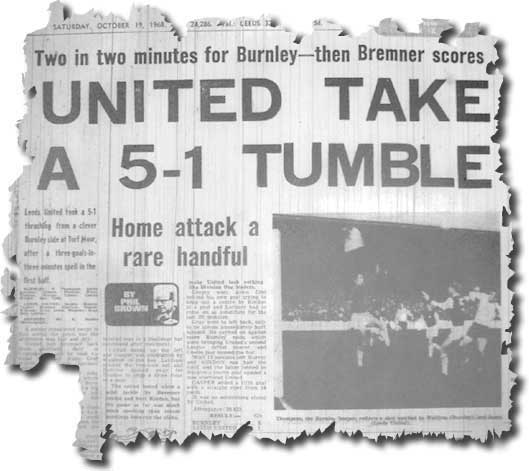 In
a season when Leeds United finally realised the rich potential they had
hinted at for five years, one particular game stood out like a sore thumb,
a very, very sore thumb, indeed. Their campaign was founded on ruthless
efficiency and leaving the minimum to chance, but it was punctuated by
the most extraordinary of calamities one Saturday afternoon towards the
end of October.
In
a season when Leeds United finally realised the rich potential they had
hinted at for five years, one particular game stood out like a sore thumb,
a very, very sore thumb, indeed. Their campaign was founded on ruthless
efficiency and leaving the minimum to chance, but it was punctuated by
the most extraordinary of calamities one Saturday afternoon towards the
end of October.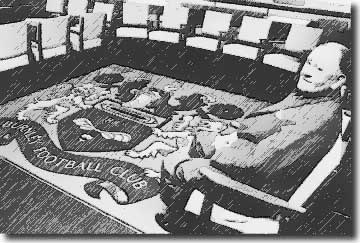 directors from attending games at Elland Road.
directors from attending games at Elland Road.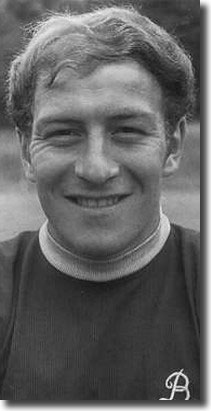 he wanted to bury it in my head! I decided to move on.'
he wanted to bury it in my head! I decided to move on.'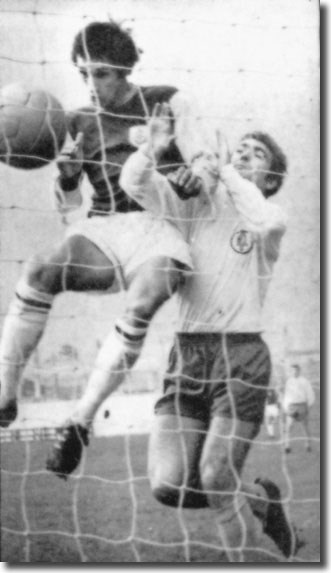 O'Grady
and Jones went on the offensive, but Gary Sprake had to catch
a Steve Kindon centre as the Lancastrians refused to slacken off.
They got the breakthrough that their early pressure merited with
two goals in a two minute spell.
O'Grady
and Jones went on the offensive, but Gary Sprake had to catch
a Steve Kindon centre as the Lancastrians refused to slacken off.
They got the breakthrough that their early pressure merited with
two goals in a two minute spell.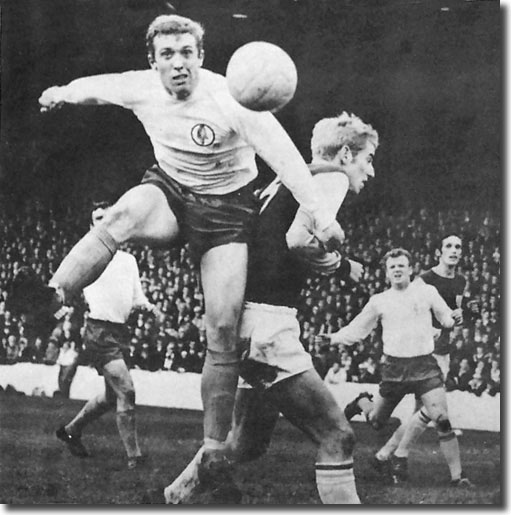 He
assessed the situation instantaneously and calmly lobbed the ball
back over everyone's heads, including the stranded Sprake, and
into the net. It was a breathtaking score and set the perfect
seal on a brilliant win for the men from East Lancashire.
He
assessed the situation instantaneously and calmly lobbed the ball
back over everyone's heads, including the stranded Sprake, and
into the net. It was a breathtaking score and set the perfect
seal on a brilliant win for the men from East Lancashire.